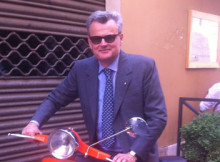In 1855 the Marquis Francesco Patrizi built a palace on Rome’s Via Margutta 54, providing artists’ studios where later Pablo Picasso, Igor Stravinsky, and Giacomo Puccini would live and work. Five years ago, the Marquis’ greatgreat grandson, Alberto Moncada di Paternò, converted the studios into a boutique hotel, Margutta 54. It was swiftly followed by two more boutique properties on Via Mario de’ Fiori and Via Babuino. Thus the privately owned hotel chain, Rome Luxury Suites, was born, comprising three hotels in the most charming streets around the Spanish Steps area of Rome. Moncada, an advertising-exectutive-turned-hotelier, is passionate about his city and his hotels, where he says that a focus on detail is key. “I jumped into this business from the consumer’s point of view. I used to work for De Beers in London, travelling a great deal internationally, so basically half of my life has been spent in luxury hotels. Thus, I knew exactly what I wanted to do when I opened my boutique hotel in Rome. Rome is a terrific tourist destination, but it hadn’t really evolved like London or other markets. There were big, expensive five-star hotels, but in my boutique hotels I wanted to have a more relaxed experience. I wanted people to feel comfortable like I would want to feel: with very good showers, excellent air-conditioning, large rooms, more suites than rooms. And then my view is, once you pay for your room, you get everything else for free. So, when you book a room and pay $300 a night, you know that when you go to pay your bill, you don’t have any of these little hidden extras that double your room rate.
I have only been in the hotel business for seven years, but I think that consumers are appreciating this sense of home away from home, this relaxed feel, and this sense of attention to detail. I started off working in New York, in a small ad agency that handled CIGA hotels. CIGA no longer exists, but it was the first luxury hotel brand in the world. They owned the Excelsior in Rome, the Gritti Palace in Venice… all the most beautiful hotels. So I worked for about three years on this account, and I would travel to these hotels, manage the advertising campaigns, meet with the hotel directors; this was all part of my experience. Thinking back, I realise that there were two people from the CIGA days who gave me a particular perspective on detail. Detail is very important in a hotel. The rooms have to be perfect. There was a director of marketing named Bruno Calí. He was my client and he instilled in us, on the agency side, how to communicate the idea of detail, location and service. I remember one of the things he used to say was: ‘perfection down to the smallest detail’. Then, there was Mario Messina, the head of the agency, who handled CIGA in the USA. He was, in a very creative way, able to translate the ideas of luxury, detail and personalised service, and of beauty of location into the advertising campaigns. Location, location, location: this is why I also created my hotels in beautiful buildings, old palaces, even my old family palace on Via Margutta, which was built by my greatgreat grandfather as artists’ lofts. A modern building, very functional, can be beautiful, but I think it’s experience that’s the most important thing we have to sell, and the hotel has to be part of the experience. And this is what I learned in the past from Bruno and Mario, working as a young advertising executive.”


